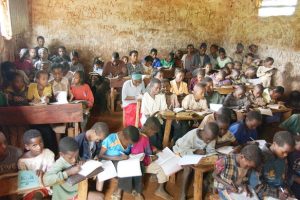
There is consensus among scholars that inculcating the habit of reading books at an early age is an essential component to prepare children for their future development and success. Reading books and listening to stories from an early age have several benefits for children. Improving their language, fostering imagination and enhancing their cognitive abilities are some of the benefits.
Scholars also have a firm stand that children who are exposed to books at an early age are more likely to become proficient readers. They also said, reading books, mainly reading with mother tongue will encourage children to develop love for books and improve language skills.
In addition to improving language skill, books have a key role in helping children to build their vocabulary and comprehension competence. However, these days, challenges associated with skilled educators, authors, illustrators, digital technology and other factors are limiting the interest of children to enjoy reading.
Lately, Ethiopian Reads, a non-profitable nongovernmental organization that works in collaboration with the Ministry of Education to promote children literature and the culture of reading in Ethiopia, had organized a forum on children books. During the event several stakeholders have participated and reflected their view concerning reading culture and children literacy.
Birhanu Girma is Ethiopia Reads Program Coordinator. According to him, the active involvement of all stakeholders in the area of children’s books and nurturing the culture of reading among children will equip the future generation with knowledge and help them to develop self-confidence. Reading culture among children is deteriorating. Several factors are contributing to this problem. To curb the challenges, promote the culture of reading in children and improve children literacy, the active involvement of all stakeholders and establishing effective networks is of critical importance. It will also help stakeholders to identify individual responsibilities for common interest. Without the active participation of stakeholders, it will not be easy for policy makers and the Ministry of Education to identify the major bottlenecks in the area of reading skill.
Laurie Curtis is Early Literacy Program Manager of the Education Department at Kansas State United State of America and Board Member of Ethiopia Reads. During her stay with this reporter Laurie said that children who are nurtured with the skill of reading have the competency not only to express themselves or lead their future in an organized manner but also to contribute meaningfully to their country. “Reading is an outlet towards literacy and it should not only be left to either the government or NGOs. It should be the responsibility of every individual and every sector. That is why it is imperative to come together and discuss the issue of literacy and reading as a prime concern of the Ethiopia Reads.”
When asked how we can nurture the culture of reading among Ethiopian children, Laurie said that prioritizing and preserving oral tradition and encouraging parents or other family members in storytelling will inspire children to learn more about local culture and develop the skill of using language. What is more, teachers should be well trained to provide instruction in their mother tongue.
According to her, the more children are exposed to oral tradition and storytelling cultures, the more they will understand their true identity and also it will help them to have proper understanding of their environment even without having books or other resources, which are scare in most developing nations and the number of books in mother language is still inaccessible.
When asked about the challenge of digital technology in discouraging children from reading books and limiting their reading skills, she said, digital technology is a one way where information is exchanged and a platform that children would be forced to receive information without interacting. This is one serious challenge for this generation. “There is one way of communication that will not let children interact and develop their literacy or reading skill. We are witnessing that the more children are exposed to digital technology, the more they are losing interest in writing and reading. This is not the only problem faced by children.
We, adults, are also trapped in a one way information access. We are losing a two way interaction of information. Children must have a chance to ask questions and interact with the people around them. As a Literacy Program Manager, I advise concerned bodies to fill the capacity of educators, authors, publishers and teachers through training.”
Laurie also advised publishers to give more emphasis on the quality and the content of books that are prepared for children. The training capacity of teachers is still a challenge to nurture children with a culture of reading. This is especially true for those early grade teachers who laid the foundation for future readers. Teachers should get proper training that will let them teach children the techniques of reading and proper teaching skills.
She also highlighted that giving priority for books and other materials does not bring the expected result without investing in teachers who are working in the area. “We focus on a lot of materials and books but we need to focus on building the capacity of teachers. When they are valued and honored, they will execute their responsibility with confidence. Educators need to be confident enough regarding their skills and knowledge. They also need to have proper training before they consider themselves as educators. The more they invest in themselves, the more they can develop self-confidence. This will let them nurture responsible citizens.”
Yitagesu Getnet, a literary scholar, was among the participants at the forum organized by the Ethiopia Reads. Asked what importance this kind of forum has for children, teachers, parents and other stakeholders, he said that conducting common discussion forums among stakeholders will give policy makers and others an insight to identify gaps in the area of children books and reading culture.
According to him, whenever researchers, policy makers and other stakeholders discuss openly, the challenges related to children’s books and literacy issues will be addressed. “For instance, research that was conducted by Ethiopia Reads indicates that within 14 years (2008- 2021) a total of 2, 800 children books were published in Ethiopia. This kind of research enables policy makers, educators, publishers and others to identify the major gaps in the area.”
Indeed, the issue of quality education and children literacy are highly dependent on the culture of reading. The more the nation gives an emphasis to the culture of reading, the more it ensures quality education. In this regard, producing quality books that draw children’s attention plays a key role. To this end, the active involvement of authors, the Ministry of Education, illustrators, parents, educators, policy makers and others will pave the way towards creating the culture of reading among children and ensuring quality education.
BY LEULSEGED WORKU
THE ETHIOPIAN HERALD THURSDAY 18 APRIL 2024





